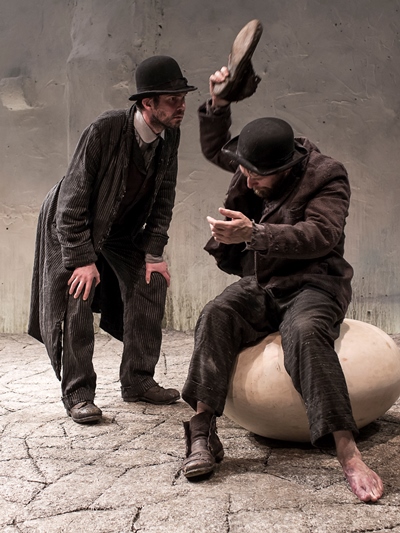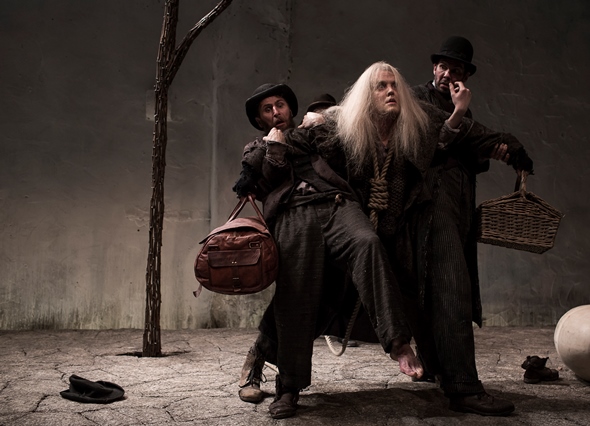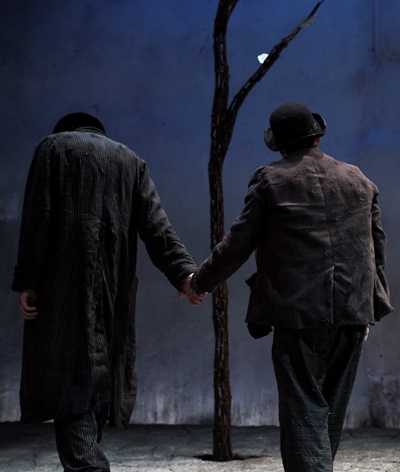Irish troupe brings Beckett’s ‘Godot’ to CST, leaving critic with nothing to wish (or wait) for
Review: “Waiting for Godot” by Samuel Beckett, produced by Druid Theatre at Chicago Shakespeare Theater through June 3. ★★★★★
By Lawrence B. Johnson
Samuel Beckett was Irish by birth but a naturalized existentialist of the French line whose most famous native son remains Jean-Paul Sartre. Watching the Irish theater company Druid perform Beckett’s “Waiting for Godot” – at once vivid and bleak, its characters dithering and hobbled and resigned to their absurd circularity – I couldn’t help thinking of Sartre’s “No Exit.”
 Beckett completed his original French-language play “En attendant Godot” in 1949, some five years after the premiere of “No Exit,” then saw his own English-language version through to the stage in 1955. Essentially, both Sartre and Beckett were showing impotent, delusional characters who have made their own prisons through indecision, inaction, what Sartre would call inauthenticity.
Beckett completed his original French-language play “En attendant Godot” in 1949, some five years after the premiere of “No Exit,” then saw his own English-language version through to the stage in 1955. Essentially, both Sartre and Beckett were showing impotent, delusional characters who have made their own prisons through indecision, inaction, what Sartre would call inauthenticity.
We may tend to think of “Waiting for Godot” as a two-character play about the old pals Vladimir and Estragon, who are doing the waiting. But their space is invaded and their occupation disrupted by two other hapless figures, the loquacious Pozzo and his nearly mute slave Lucky. That odd pair are just passing through, so to speak, but their appearance carries some elusive meaning – beyond, that is, helping Vladimir and Estragon pass the time while waiting for the never-seen Godot.
One might ask, even at this late date, who are these people, and who is Godot? I hasten to help with the second part of that mystery by pointing out the Beckett himself debunked the often resurrected notion that Godot represents God. The unfortunate English-language rendering of the name as GAH-doh (departing from the evenly accented French Go-Doh) seems to lend credence to that idea, but Beckett observed that the play was conceived in French and that the French word for God is Dieu.
So much for the lads awaiting divine revelation. That still leaves us in the dark about the characters we actually see. The Druid production offers a mesmerizing match in Marty Rea as Vladimir and Aaron Monaghan as Estragon – the former tall, animated and chatty, the latter short and as laconic as he is lethargic. While their tattered garments suggest they’ve seen better days, they are not necessarily tramps. Vladimir is curious, pensive, a philosopher; Estragon says he was once a poet and a good one, pointing to his shabby attire as evidence of his succès d’estime.
 Having a lot of time on their hands, Vladimir and Estragon, who address each other as Didi and Gogo, ramble through a sort of free association of topics, even brushing religion. Vladimir does most of the talking, Estragon intermittently responding with a droll comment as pointed as it is terse. Monaghan is a delightful Estragon: sad, earnest, perceptive and direct, a lovely foil to Rea’s perky, flitting extrovert.
Having a lot of time on their hands, Vladimir and Estragon, who address each other as Didi and Gogo, ramble through a sort of free association of topics, even brushing religion. Vladimir does most of the talking, Estragon intermittently responding with a droll comment as pointed as it is terse. Monaghan is a delightful Estragon: sad, earnest, perceptive and direct, a lovely foil to Rea’s perky, flitting extrovert.
But they are of course equally purposeless, though they imagine a purpose: They are waiting for Godot, and they keep reminding each other of that fact. In their chatter, they lose track of where they are and what they are doing. From time to time they simply resolve to leave and then they remember that they can’t just leave because they’re waiting for Godot.
 In a tragi-comical sense, it’s a routine between melancholy clowns. The gag becomes overtly funny when they find a hat, which added to their own hats makes three. And here comes the old vaudeville schtick: One passes the hat to the other fellow, who removes his own hat and, putting the new hat on his head, hands his own cap to the other chap, who completes the cycle, handing off his cap to the other man – until we’re watching a windmill of hats.
In a tragi-comical sense, it’s a routine between melancholy clowns. The gag becomes overtly funny when they find a hat, which added to their own hats makes three. And here comes the old vaudeville schtick: One passes the hat to the other fellow, who removes his own hat and, putting the new hat on his head, hands his own cap to the other chap, who completes the cycle, handing off his cap to the other man – until we’re watching a windmill of hats.
The found hat belongs to Lucky (Garrett Lombard), who has left it behind after the ironically named slave and his master Pozzo (Rory Nolan) passed through en route to market, where Pozzo hoped to sell Lucky. Nolan’s Pozzo is pompous figure blow up with the air of self-importance. He controls Lucky via a long rope looped around the poor fellow’s neck; Lucky bears all their baggage, never puts any of it down even when at stooped rest, and responds instantly and precisely to Pozzo’s every imperious command.
Vladimir and Estragon encounter Pozzo and Lucky a second time, the next day. But now Pozzo is blind, and Lucky is leading – from behind, as it were, still the dutiful slave.
 Our heroes also meet twice with another visitor, a young boy, Godot’s emissary. He comes to tell Vladimir and Estragon that Godot cannot join them today, but almost certainly will see them tomorrow. And the next day the boy reappears with the same message. As they have done several times over the course of the play, Vladimir and Estragon resolve to leave. They will leave. They might as well leave.
Our heroes also meet twice with another visitor, a young boy, Godot’s emissary. He comes to tell Vladimir and Estragon that Godot cannot join them today, but almost certainly will see them tomorrow. And the next day the boy reappears with the same message. As they have done several times over the course of the play, Vladimir and Estragon resolve to leave. They will leave. They might as well leave.
To borrow a phrase from Stephen Sondheim, “Waiting for Godot” is a moment in the woods. Except that what happens is nothing – in the first act; and then nothing happens again in the second act. It is an absurdist play that holds up the mirror to the times, the aftermath of a world war; no, two world wars, that had left Europe pulverized physically and spiritually.
Designer Rachel Towey’s set perfectly reflects Beckett’s concept of an inhospitable world barren and pointless. A single shorn tree and a low rock are the appurtenances of this good earth. Likewise, the weeds worn by Vladmir and Estragon are the shabby remnants of clothing that once might have been handsome. But in truth, the world holds nothing that is fine or orderly or hopeful. This is Beckett’s post-apocalyptic perspective on life, a tale of idiocy, nattering and nonsensical.
I don’t expect to see it set out more forcefully or wittily, or indeed authentically.
Related Link:
- Performance location, dates and times: Details at TheatreInChicago.com


